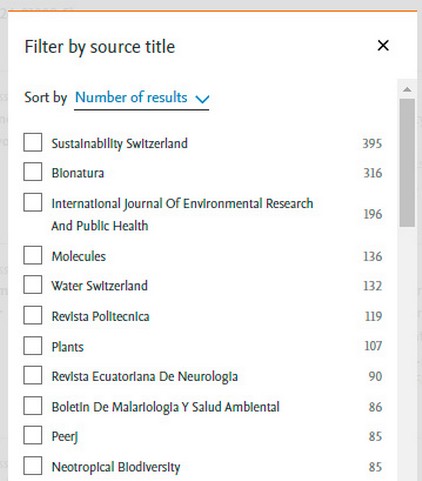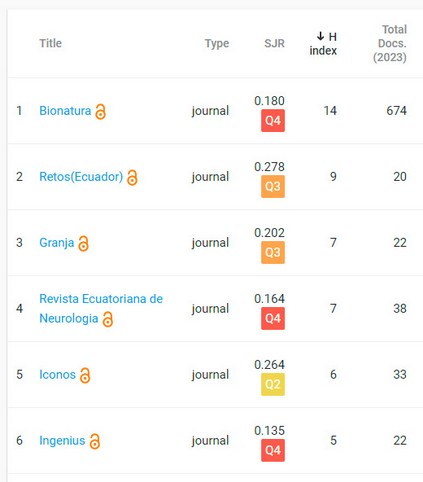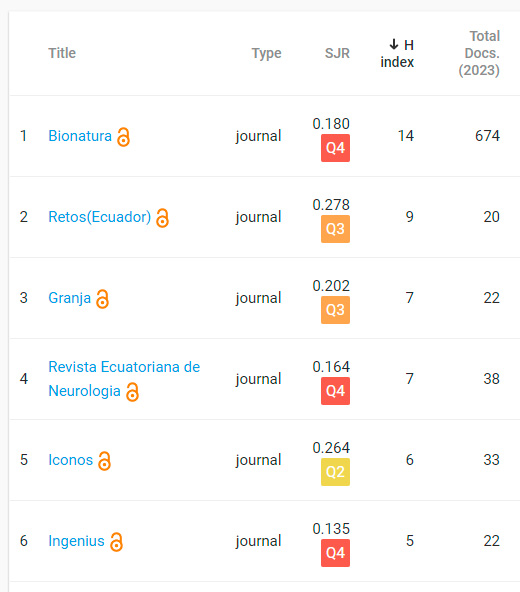ISSN PROBLEM
El Impacto de Bionatura en Ecuador y la Controversia del ISSN
La revista Bionatura, durante su publicación en Ecuador, se erigió como un faro para la investigación científica en el país. Su crecimiento exponencial, de 40 documentos en 2016 a 674 en 2023, es un testimonio de su creciente relevancia y su papel en la difusión de investigaciones en biotecnología y ciencias de la vida, tanto a nivel local como internacional. La indexación en Scopus y su enfoque en los Objetivos de Desarrollo Sostenible (ODS) solidificaron aún más su reputación como una publicación seria y comprometida con los desafíos globales.
Sin embargo, el reciente traslado de la revista a España y la revelación de que la SENESCYT otorgó el ISSN a un sitio fraudulento arrojan una sombra sobre este legado positivo. La situación plantea serias preocupaciones sobre la integridad del proceso de asignación de ISSN en Ecuador y sus posibles implicaciones para la comunidad científica del país.
Implicaciones para Ecuador:
- Pérdida de una plataforma valiosa: El traslado de Bionatura representa la pérdida de una plataforma crucial para la difusión de la investigación ecuatoriana, lo que podría dificultar la visibilidad y el reconocimiento internacional de los científicos locales.
- Daño a la credibilidad: La asociación de la SENESCYT con un sitio fraudulento plantea interrogantes sobre la rigurosidad de sus procesos de evaluación y podría afectar la confianza en otras publicaciones científicas ecuatorianas.
- Desincentivo a la investigación: La incertidumbre generada por esta situación podría desalentar a los investigadores a publicar en revistas nacionales, lo que tendría un impacto negativo en el desarrollo científico del país.
A continuación explicamos en detalle lo sucedido.
El número internacional normalizado de publicaciones seriadas (ISSN) y la propiedad de una revista científica
El ISSN (International Standard Serial Number) y la propiedad de una revista científica son dos conceptos distintos, aunque pueden estar interrelacionados. He aquí un desglose:
ISSN:
El ISSN es un código de ocho dígitos que identifica de forma unívoca una publicación en serie, como una revista científica.
- Ayuda a distinguir entre revistas con títulos similares.
- El ISSN no revela información sobre la propiedad ni el titular de los derechos de autor.
- Una revista puede mantener el mismo ISSN aunque cambie de editor (a menos que el título cambie significativamente).
- Es posible que se asigne un nuevo ISSN si la revista sufre un cambio de título importante o de país.
Propiedad de una revista científica:
La propiedad de una revista científica se refiere normalmente a quién posee los derechos de propiedad intelectual (PI) asociados a la revista. Esto incluye
- El título de la revista
- El contenido publicado en la revista
- El sitio web y la marca asociados a la revista
- La titularidad puede recaer en un particular, una empresa (como una editorial) o una institución (como una universidad).
Relación entre el ISSN y la titularidad:
- Poseer el ISSN no equivale a poseer la revista.
- Alguien podría obtener un ISSN para un sitio web falso (https://revistabionatura.org/) que imitara una revista real (https://revistabionatura.com/) , pero eso no le otorgaría la propiedad del contenido de la revista real.
Importancia de la titularidad:
La propiedad determina quién tiene el derecho legal a:
- Publicar contenidos en la revista
- Permitir el acceso a la revista
- Controlar la marca y la dirección editorial de la revista.
En resumen:
El ISSN es una herramienta de identificación, mientras que la titularidad determina quién controla la propiedad intelectual de la revista científica.
Con esto aclarado me dirijo a ustedes para analizar la situación actual de la Revista Bionatura (https://revistabionatura.com/) y su ISSN. Como saben yo Nelson Santiago Vispo editor jefe de Bionatura, fui el creador y fundador de la Revista Bionatura en Ecuador en el 2015 y colaboré con la empresa CEBA (Centro Ecuatoriano de Biotecnología y Ambiente) en el inicio de la publicación. Sin embargo, debido a que CEBA no realizó ninguna actividad editorial ni aportó económicamente al proyecto, me vi obligado a desvincularme paulatinamente de esta empresa.
Posteriormente, por motivos de salud, me mudé a España en 2022. Tras mi partida, CEBA aprovechó la situación para hacerse del ISSN 1390-9355 ante el SENESCYT (Secretaría Nacional de Ciencia, Tecnología e Innovación). Para ello, plagiaron el sitio mio (https://revistabionatura.org/) y, a pesar de que presenté toda la documentación legal que demostraba mi propiedad (pagos realizados, propiedad de los dominios y patente del nombre registrada en Ecuador), el SENESCYT les otorgó el ISSN a CEBA.
Para su referencia, he reunido todos los documentos que respaldan mi demanda en los siguientes enlaces, ordenados por fecha:
Propiedad de la Marca:
- Revista Bionatura: Patente de marca otorgada a Nelson SantiagoVispo (Clinical biotec) en mayo del 2017 por la oficina de patentes de Ecuador (SENADY).
- 11 de mayo del 2017 la oficina de patente de Ecuador SENADY le otorga la patente de marca de Revista Bionatura a Nelson Santiago Vispo, Editor jefe de Revista Bionatura
Propiedad del Dominio Web:
- www.revistabionatura.com: Registrado desde el 2014 a nombre de Nelson Santiago Vispo, Editor jefe de Revista Bionatura. Certifico del Open Journal System USA sobre propiedad desde el 2014 del dominio www.revistabionatura.com por parte de Nelson Santiago Vispo, Editor jefe de Revista Bionatura.
- www.revistabionatura.org: Copia del sitio original creada por CEBA en diciembre de 2023.
ISSN:
1 enero 2016 se sube https://www.revistabionatura.com/ y aparecen como Publisher CEBA, Clinical Biotec y la ESPE.
- ISSN: Aprobado por SENESCYT Ecuador a nombre de Clinical Biotec en enero de 2018 y vuelto aprobar en mayo del 2019 y marzo del 2023
4 enero 2018 Aprobacion por el SENESCYT Ecuador solicitud de Clinical Biotec donde se encargaría de la revista, pero seguía CEBA. La respuesta del Senescyt firmada.
23 Mayo 2019 Carta firmada por SENESCYT Ecuador para poner a Yachay en el ISSN, siguen CEBA y Clinical Biotec. La respuesta del SENESCYYT firmada.
14 marzo 2023 Carta al SENESCYT de Clinical Biotec firmada por la DIRECTORA DE INVESTIGACIÓN CIENTÍFICA
- ISSN copiado: Obtenido por CEBA en febrero de 2024 del SENESCYT por su sitio web copiado (www.revistabionatura.org).
29 de diciembre de 2023, CEBA crea una copia del sitio de la revista y le llama www.revistabionatura.org. Con este sitio copia, el SENESCYT Ecuador le aprueba el ISSN a CEBA y así aparece en la página del portal ISSN Francia con fecha del 10 de febrero de 2024.
1 de marzo del 2024 es que el SENESCYT responde a Nelson Santiago Vispo, Editor jefe de Revista Bionatura , tras habersele escrito desde el QUIPUX de la Universidad Yachay, que ellos aprobaron a CEBA como propietario del ISSN de Revista Bionatura, aun subiendo al Portal ISSN un sitio (www.revistabionatura.org) que copiaron del original (https://www.revistabionatura.com/). Carta firmada por la misma DIRECTORA DE INVESTIGACIÓN CIENTÍFICA.
- Nuevo ISSN: Obtenido por Clinical Biotec en abril de 2024 en España para el sitio web original (https://bionaturajournal.com/).
19 Abril del 2024 Clinical Biotec obtiene un nuevo ISSN 3020-7886 para Bionatura desde España https://bionaturajournal.com/
Actualizaciones de ambos sitios en internet desde el 2016 que se funda la revista Bionatura:
- Si quieren comprobar cuando se subieron ambos sitios a internet para que vean la cronologia, puede entrar a https://web.archive.org/ y buscar por www.revistabionatura.com (Saved 249 times between June 20, 2016 and May 11, 2024) y despues busquen www.revistabionatura.org (Saved 4 times between December 27, 2023 and April 25, 2024). En internet todo lo que hagas deja un rastro, mas aun el fraude.
DOI de los articulos gestionados por crossref.org
Crossref es una organización sin ánimo de lucro que asigna identificadores únicos y permanentes (DOI) a artículos académicos, libros y otros contenidos digitales. Estos DOI permiten identificar de forma inequívoca cada contenido, independientemente de su ubicación en internet.
En el caso de la Revista Bionatura:
- Los DOI legítimos: Todos los DOI de los artículos originales de la Revista Bionatura pertenecen a Clinical Biotec, el editor legítimo de la revista. Estos DOI se pueden encontrar y verificar en el buscador de Crossref:
https://search.crossref.org/ - El sitio fraudulento: El sitio web www.revistabionatura.org es una copia fraudulenta de la revista original. Los DOI que aparecen en los artículos nuevos de este sitio no son válidos, ya que no han sido registrados por Clinical Biotec en Crossref.
- Redirección de DOI: Al intentar acceder a los DOI de los artículos del sitio fraudulento, todos te redirigen al sitio original. Esto se debe a que los DOI originales siguen siendo válidos y están asociados a los artículos auténticos en Crossref.
- DOI no válidos: En el número 2 de 2024 de la revista fraudulenta, los DOI que aparecen en los artículos (por ejemplo,
https://dx.doi.org/10.21931/RB/2024.09.02.1
En resumen:
Los DOI de los artículos originales de la Revista Bionatura son gestionados por Clinical Biotec y se pueden verificar en Crossref. Los DOI que aparecen en el sitio fraudulento www.revistabionatura.org no son válidos y no deben ser utilizados.
Comité Editorial:
- Comité original: El sitio web original (https://www.revistabionatura.com/) muestra un comité editorial que no incluye a miembros de CEBA.
- Comité copiado: El sitio web copiado por CEBA (www.revistabionatura.org) incluye el comité editorial original sin autorización, excepto por los 12 miembros que pertenecen a CEBA.
Contenido publicado en la revista:
Todo el contenido editorial de la revista Bionatura (1300 artículos del 2016 al 2023) ha sido seleccionado, revisado y editado por el comité editorial con el editor jefe al frente, los que incluye:
- Comunicación con los autores
- Recepción de los artículos
- Primera revisión por el comité editorial
- Comunicación con los revisores y envió a los tres revisores por artículos
- Recepción de las revisiones por pares, y envió a los autores de la decisión editorial y los arreglos a hacer en los articulo o sin son rechazados
- Revisión, edición y maquetación de los artículos arreglados
- Envió a los autores de la versión final para su revisión
- Publicación de estos en formato HTML y PDF.
- Actualización en Cross-reference de los DOI
Que demuestre Julio Pineda (CEBA) de haber realizado algunos de estos pasos, Clinical Biotec los puede demostrar todos.
Pago de los Servicios a terceros para el funcionamiento de la Revista:
- Compra del dominio revistabionatura.com
- Pago por la patente del nombre Revista Bionatura
- Pago por el hosting del dominio en Open Journal system desde el 2015 hasta la actualidad
- Plataforma para el Diseño de la Pagina Web y FTP del sitio desde el 2015 hasta la actualidad
- Pago del servicio de Cross-reference para la obtención de los DOI desde el 2015 hasta la actualidad
- Pago por edición, maquetación, traducción, de todos los artículos publicados desde el 2015 hasta la actualidad
- Pago por publicidad en las redes sociales
- Otros servicios de protección de datos
Que demuestre Julio Pineda (CEBA) de haber realizado algunos de estos pagos, Clinical Biotec los puede demostrar todos.
Continua el engaño:
El primer número del 2024 que aparece en el sitio nuevo (https://bionaturajournal.com/index.html) como Vol 1 N° 1 2024, CEBA lo tiene en el sitio copiado como Vol 9 N° 1 2024. CEBA está entonces copiando de un sitio web del que no es propietario ( igual que del anterior) sino del que no tiene tampoco ISSN y que no pertenece a Ecuador, sino a España.
En el sitio web copiado de CEBA (www.revistabionatura.org), además de haber plagiado el sitio completo del original, también ha copiado al Comite Editorial, sin la autorización de ninguno de sus miembros (a excepción de los 12 primeros que pertenecen a CEBA). El resto pertenece al comité editorial de Bionatura Journal. El comité editorial de Bionatura Journal está reclamando a CEBA el uso de sus nombres sin autorización.

Figura 1. Cantidad de Publicaciones Ecuatorianas de Biotecnologia , Medicina y Ciencias de la vida publicadas por Bionatura desde 2016 al 2023.

Figura 2. Posición en Scimago como la revista ecuatoriana con mayor indice H.
¿Quien ha sido el mayor perjudicado con esta situacion?
De toda esta situación vergonzosa, el daño peor es sobre los investigadores ecuatorianos que a través de la Revista Bionatura han podido indexar 316 trabajos en Scopus desde el 2016 al 2023 (Figura 1), convirtiendo a Bionatura en la revista ecuatoriana que más trabajos ha aportado a esta base de datos de renombre internacional en ese período. Scimago por su parte la pone como primera en su clasificación por país con mayor indice H (figura 2). Actualmente se han visto afectados numerosos eventos científicos planificados por universidades ecuatorianas que se han tenido que desvincular de Bionatura por esta situación y además una de las Universidades foráneas como la UCO de Colombia también se ha desvinculado del proyecto, aunque el sitio fraude aun la tiene como coeditora. Entonces antes caso como estos que garantias ofrece Ecuador.
Si bien Bionatura ha dejado un legado positivo en Ecuador al fomentar la investigación y la publicación científica, la controversia del ISSN subraya la necesidad de fortalecer los mecanismos de control y transparencia en la asignación de identificadores de publicaciones seriadas. Es fundamental garantizar la integridad de estos procesos para proteger la credibilidad de la ciencia ecuatoriana y fomentar un entorno propicio para el desarrollo de la investigación en el país.
Referencias
ISSN:
- International Standard Serial Number (ISSN): https://www.unccd.int/resources/knowledge-sharing-system/international-standard-serial-number-issn-portal
- ISSN Manual: https://www.unccd.int/resources/knowledge-sharing-system/international-standard-serial-number-issn-portal
- Frequently Asked Questions (FAQs) about ISSN: https://www.unccd.int/resources/knowledge-sharing-system/international-standard-serial-number-issn-portal
Ownership of Scientific Journals:
- Copyright in Journal Articles (World Intellectual Property Organization): https://www.wipo.int/copyright/en/
- Publishing Ethics and Scientific Integrity: https://www.elsevier.com/about/policies-and-standards/publishing-ethics
- Who Owns the Copyright to a Journal Article? (Copyright Research Center): https://copyright.columbia.edu/

